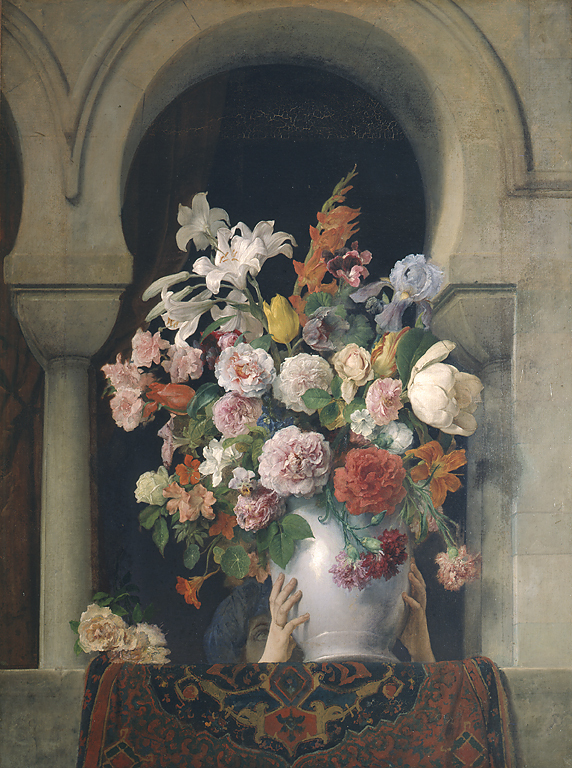FRANCESCO HAYEZ
(Venice, 10 February 1791 – Milan, 12 February 1882)
Vase of Flowers on the Windowsill of a Harem
1881
Oil on canvas
125×94.5 cm

PAINTING
Francesco Hayez painted Vase of Flowers on the Windowsill of a Harem in 1881, one year before his passing, and bequeathed it to Brera in his will. In fact, for sixty years he had taught painting at the Academy of Fine Arts, where he also had his studio.
In this work, the oriental theme so popular at the time, already present in his Odalisque, is combined with the floral still life, previously tackled by the artist in Melancholy.
The vase is placed at the centre of the image, the framing extremely tight. The observer’s point of view is drastically lowered; this, and the chromatic contrast between the dark shadow framed by the harem’s window and the bright, vivid hues of the cut flowers portrayed with a Flemish attention to detail bring out the main subject: not the vase of flowers, nor the girl, but rather her splendid and graceful hands.
BIOGRAPHY
Francesco Hayez (Venice, 1791 – Milan, 1882) was the greatest exponent of the Italian Romantic Movement. Some of his works, such as the famous Kiss, produced in three different versions, are acknowledged symbols of the Unification of Italy. Because of his extremely accurate historical reconstructions, his sentimental inflections, and his political bent, the artist’s relevance is equal to that of Alessandro Manzoni in the field of literature.
Having completed his studies at the Academy of Fine Arts in Venice, he was awarded a scholarship in Rome, where he met the famous Neoclassical sculptor, Antonio Canova. He spent most of his career in Milan, where he moved in 1822 when he was assigned a teaching position at Brera Academy, of which he later became the director. In the Lombard city he was extremely well known as a portrait artist: particularly noteworthy is the painting of the author of The Betrothed, later printed in every Italian schoolbook, in which he was able to capture the writer’s reserved nature thanks to his talent for psychological introspection.

